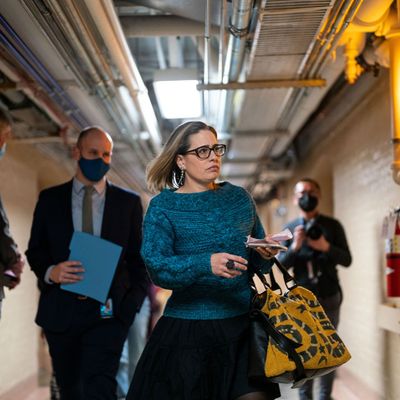
When word came down earlier this week that Senate Democrats might put aside plans to act on the Build Back Better budget reconciliation bill in the final days of this year in order to mount a blitz to enact voting rights legislation, many wondered if some sort of unexpected breakthrough on filibuster reform was in the works. Senate Republicans, after all, had filibustered three different Democratic-backed voting rights measures this year (including the comprehensive For the People Act; a lite version designed by Senator Joe Manchin known as the Freedom to Vote Act; and the John Lewis Voting Rights Enhancement Act, which would restore key features of the Voting Rights Act of 1965 that were gutted by the U.S. Supreme Court). Yet when last we checked, Manchin and Kyrsten Sinema, (probably with quiet support from a few other Democrats) were still adamantly opposed significant filibuster reforms, including a “carve-out” for voting rights measures.
Surely Majority Leader Chuck Schumer wouldn’t raise expectations that voting rights legislation might actually pass unless he had something up his sleeve, right? Well, maybe he would.
We may never know if the desultory negotiations reportedly under way with Manchin to get him to support marginal filibuster reforms (likely a requirement for a “talking filibuster,” or eliminating single-senator obstruction via objections to unanimous consent agreements, or possibly minor changes in procedures for invoking cloture) had real promise. But now Kyrsten Sinema has confirmed that she isn’t buying any of this, as Politico reports:
The Arizona moderate is making clear that she intends to keep protecting the Senate’s 60-vote requirement on most legislation and she isn’t ready to entertain changing rules to pass sweeping elections or voting legislation with a simple majority. Her Democratic colleagues have been discussing those revisions as they weigh dropping their focus on President Joe Biden’s $1.7 trillion climate and social spending bill and pivoting to voting rights, though it’s not clear that avenue will be any more successful.
The Arizonan isn’t qualifying her opposition to filibuster reform — or at least the kind of reforms that would be necessary to pass legislation opposed by nearly all Republicans — at all. It’s categorical:
In a statement to POLITICO, a spokesperson said that Sinema “continues to support the Senate’s 60-vote threshold, to protect the country from repeated radical reversals in federal policy which would cement uncertainty, deepen divisions, and further erode Americans’ confidence in our government.” Since joining the Senate in 2019, Sinema’s been a fierce defender of the filibuster and warned that reversing it could lead to terrible outcomes for Democrats down the line.
In particular, Sinema’s spokesperson said, any voting rights legislation passed without Republican support would be “rescinded in a few years and replaced by a nationwide voter-ID law, nationwide restrictions on vote-by-mail, or other voting restrictions currently passing in some states extended nationwide.”
There’s not even a tiny opening there, folks. Yet it appears that Schumer, with the complicity of the White House, is not only going to shove aside BBB to make a doomed push for voting rights legislation, he’s also linking it to the January 6 anniversary to give this effort maximum attention. A separate report from Politico suggests that Biden staffers are planning a blot-out-the-sky voting rights push even as they acknowledge it will almost certainly fail:
The White House wants to mark the new year with a forceful push for voting rights, portraying the protection of the ballot as a battle for democracy itself. But despite a renewed emphasis from an increasingly impatient and frustrated base, prospects for legislative success still look grim.
West Wing aides believe that fresh federal efforts to defend the ballot and install safeguards ahead of the midterm elections are likely to be dashed by some Democrats’ resistance to changing the Senate filibuster, a reluctance spearheaded by Sen. Joe Manchin (D-W.Va.).
This “bearish” assessment was made before Sinema dropped the hammer again on the whole idea of partisan voting rights legislation.
What’s really going on here? It seems Democrats in the Senate and in the White House are feeling the pressure from voting rights advocates to do something, anything, to show they actually care about this issue as urgently as they care about the tasty snacks for voters provided by BBB. That pressure is indeed growing intense:
“The time is now. The urgency could not be more palpable than it is now,” said Rev. Al Sharpton, president of the National Action Network and a Biden confidant, who, like others, argued that voting rights should have been the administration’s top priority in the wake of the moves by nearly 20 Republican-led legislatures to tighten state election laws.
“An inaction at this point would lead to an inaction of Black voters. People are saying, ‘If they don’t do this, I’m not voting,’” the civil rights leader said. “People are saying they feel betrayed.”
It’s unlikely that Black voters will feel better if Democrats raise expectations about voting rights, but their effort fails because a handful of senators continue to believe what they’ve said they believe all year. Even if Biden made a national address pointing a trembling finger at photographs of Manchin and Sinema and demanding their lives be made a living hell unless they bend on the filibuster, there’s no reason to think it would change anything; given the political complexion of West Virginia, Joe Manchin might actually welcome the attack. So the president had better be prepared to offer something of value on voting rights that does not depend on the U.S. Congress. Otherwise he and his party are cruising for a bruising, now and next November.






























